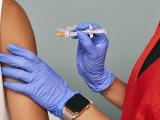Nov 18, 2010
Adult immunization slightly improves, but gaps remain
The latest adult vaccination data from the US Centers for Disease Control and Prevention (CDC) show that rates are slowly improving, but trends show a decrease in pneumococcal vaccination and some of the lowest uptake in minority groups, Dr Melinda Wharton, from the CDC's National Center for Immunization and Respiratory Diseases, said yesterday at a press conference. The event was hosted by the National Foundation for Infectious Diseases (NFID), which also released surveys on consumers and physicians that suggest part of the reason for low adult vaccination rates may rest with communication gaps between doctors and patients. About 90% of primary care physicians said they discuss vaccinations with their adult patients, but only about half of patients remember their physicians raising the topic. Wharton said the dip in pneumococcal vaccination reflects the addition of new risk groups: smokers and people with asthma. She said the CDC's data also showed increases in healthcare worker vaccination for influenza (up 7% to 53%), hepatitis, and tetanus, diphtheria, and pertussis (Tdap). The CDC's data are from the 2009 National Health Interview Survey, which included about 33,500 households. The NFID surveys were conducted in October.
European survey finds 77 NDM-1 resistance cases in past 2 years
A survey by the European Centre for Disease Prevention and Control (ECDC) found 77 illness cases in Europe from 2008 to 2010 involving bacteria with the new resistance factor known as NDM-1, according to a Eurosurveillance report today. NDM-1, or New Delhi metallo-beta-lactamase 1, renders gram-negative bacteria resistant to nearly all antibiotics. It has been found in a number of countries in recent months, most commonly in people who had received medical care in India or Pakistan. The European report says 13 of 29 countries included in the survey reported NDM-1 cases, 54% of which involved Klebsiella pneumoniae. For 55 patients with a known travel history, 31 had traveled to or been hospitalized in Indian or Pakistan, and 5 had been hospitalized in the Balkan region. Possible nosocomial transmission was identified in 13 of the 77 cases. The report concludes that NDM-1 "is spreading across Europe" and that surveillance for the factor must be enhanced and control measures implemented.
Nov 18 Eurosurveillance report
Report details occupational transmission of meningitis
A report highlighting the importance of adequate personal protective equipment (PPE) details how a police officer and respiratory therapist contracted bacterial meningitis while administering to a patient while wearing only gloves for protection. The authors, writing in Morbidity and Mortality Weekly Report (MMWR) today, describe a 36-year-old man whom police discovered unconscious in his home. While wearing gloves, one of the officers rolled the patient from his back to his side and adjusted his head to aid breathing. In the emergency department (ED), a respiratory therapist assisted with intubation and was present during airway suctioning. Later, the patient, police officer, and respiratory therapist all tested positive for the same strain of Neisseria meningitides. They were the only 2 of the 10 first responders and healthcare workers who attended closely to the patient to test positive for the bacterium. All 4 firefighters and paramedics wore N-95 respirators, but only 1 of 5 healthcare workers wore respiratory protection: A second respiratory therapist wore a surgical mask and face shield. Investigation later determined that a lack of knowledge of where PPE was located in the ED was a major factor in the workers not using it. A note accompanying the report says, "Employers should provide infection-control training and PPE to potentially exposed workers."
Nov 19 MMWR report
Study says sheep with scrapie can spread infectious prions via milk
Researchers writing in the Journal of Virology report that sheep that have scrapie and lentiviral mastitis secrete infectious prions into their milk. Prions are the misfolded proteins associated with the fatal neurologic diseases known as transmissible spongiform encephalopathies, which include scrapie and mad cow disease. The researchers from Europe and the United States report that prions in the milk of infected sheep led to infection in nearly 90% of lambs exposed to the milk. "Thus lentiviruses enhance prion transmission, conceivably sustaining infections in flocks for generations," they write. They said their findings also suggest that prions in pooled sheep milk could spread to uninfected sheep and potentially to other animals.
Nov 17 J Virol article
Researchers pinpoint statin antibacterial properties
A researcher team led by scientists from the University of California, San Diego (UCSD) found that the popular class of cholesterol-lowering drugs called statins may also protect against bacterial infections like pneumonia and sepsis, according to a UCSD press release. In looking at how statins affect the immune capacity of phagocytes (white blood cells that fight pathogens) against Staphylococcus aureus, the team found that the drugs assist bacterial clearance by phagocytes. They found that statins stimulated the phagocytes to release "extracellular traps"—webs of DNA-based filaments embedded with anti-microbial peptides and enzymes capable of trapping and killing bacteria. Statins are the most widely prescribed drugs in the world, according to the release, with an estimated 30 million Americans alone taking them.
Nov 18 Cell Host Microbe abstract
Nov 17 UCSD press release



















